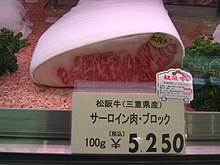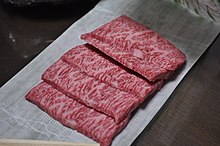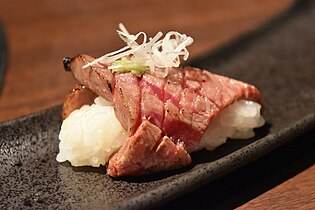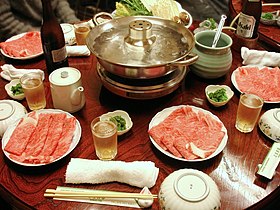Matsusaka beef

Matsusaka beef (松阪牛, Matsusaka-ushi, Matsusaka-gyū also "Matsuzaka beef") is the meat of Japanese Black cattle reared under strict conditions in the Matsusaka region of Mie in Japan. It has a high fat-to-meat ratio. Within Japan, Matsusaka is one of the three Sandai Wagyū, the "three big beefs", the others being Kobe beef and Ōmi beef or Yonezawa beef. About 2,500 cows are slaughtered for Matsusaka beef each year; the meat commands high prices.[1]
History
[edit]
Before the 19th century, beef was not typically a part of the average Japanese diet.[2] Farmers in the Mie Prefecture would raise smaller and more muscular, female cows to do agricultural work.[2] When westerners introduced them to eating beef, farmers began to raise the cows to have traits that were more favorable for human consumption.[2] The "National Beef Exposition" awarded Matsusaka with the medal of high honor in 1938.[2] The award helped make Matsusaka more well known.[2] The beef became famous for its marbling, rich flavor, and tenderness.[3]
Original standards
[edit]
The cows take roughly three years to mature.[2] In order for the meat to be sold under the Matsusaka name, it must meet strict standards.[2] Only virgin female cows can be sold as Matsusaka beef and all calves must be of a breed registered by the Matsusaka Beef Management System.[2] Most of the meat is sold through stores owned by the Matsusaka Beef Cattle Association.[4] To prevent cheap meat from being sold under the Matsusaka name, all authentic stores have an "Association Member's Certificate". The Mie Prefecture Matsusaka Shokuniku Kosha public corporation implemented a system for tracking the cows to ensure authenticity. All cattle are given a 10-digit ID.[4] The date of birth, location of birth, date it was slaughtered, shipping information, and the bloodline of each cow can be found by entering the ID on a website.[4]
Cooking
[edit]While Matsusaka beef can be eaten as a steak, there are more traditional methods of cooking the meat. Shabu-shabu is prepared with very thin slices of meat which are quickly dipped in a kelp broth and then eaten. Sukiyaki is a method that involves simmering thin slices of meat in a pot with a sauce of sugar, sake and soy sauce. After the meat has been cooked, it is removed from the pot, dipped in a raw egg and eaten.[5] The melting in one's mouth sensation comes from the unsaturated fatty acids in the beef.[4]
Gallery
[edit]-
At a store
-
Barbeque on a shichirin grill
-
As sushi
-
Prepared for shabu-shabu
-
In a bento
-
In gyūdon
-
Matsusaka beef horumon
References
[edit]- ^ Strom, Stephanie (18 July 2001). "In Japan, A Steak Secret To Rival Kobe". The New York Times. ISSN 0362-4331. Retrieved 16 June 2008.
- ^ a b c d e f g h Matsusaka Beef Archived 25 April 2017 at the Wayback Machine. JapanBrand. Japan National Tourism Organization.Accessed January 2018.
- ^ "Matsusaka Beef". JapanTravel. Retrieved 29 January 2017.
- ^ a b c d Photos: Satoru Naito (June 2016). "[editorial] Matsusaka Beef, the Ultimate Wagyu: a Visually-Arresting and Delicious Work of Art". Japan Quality Review. Archived from the original on 2 August 2016.
- ^ Goode, Brandi (7 October 2014). "Ultimate Japan Wagyu beef guide". CNN. Retrieved 3 February 2017.







